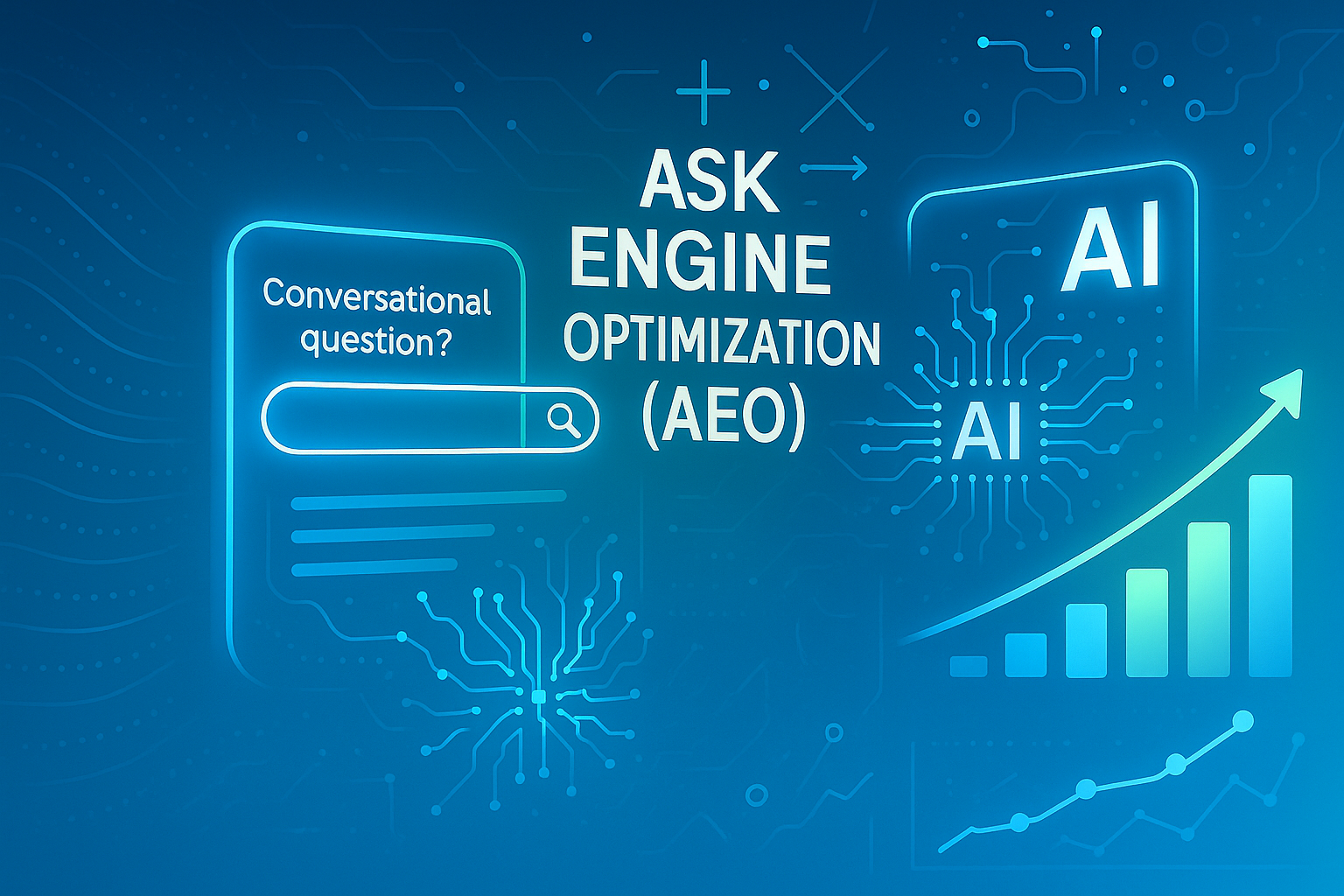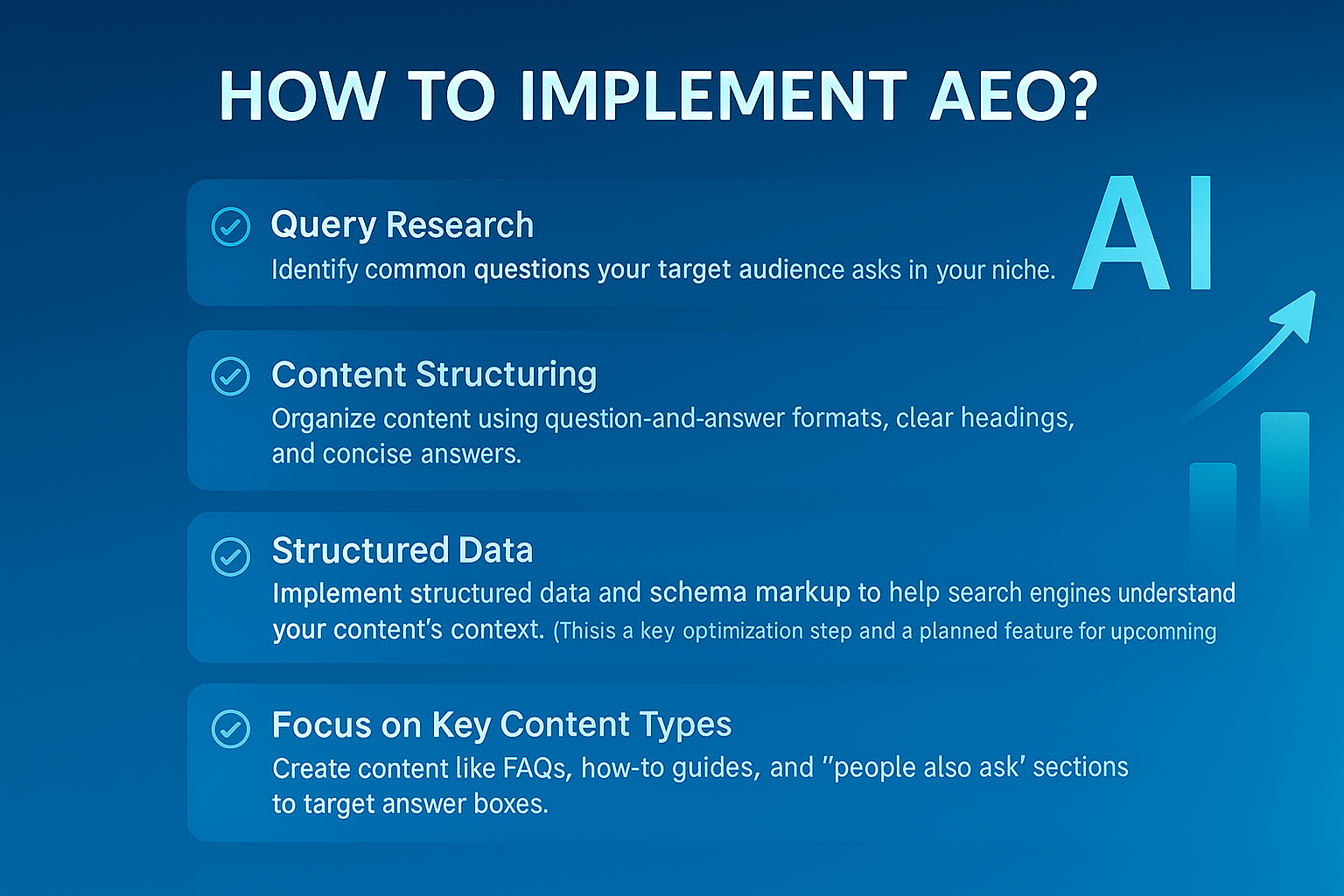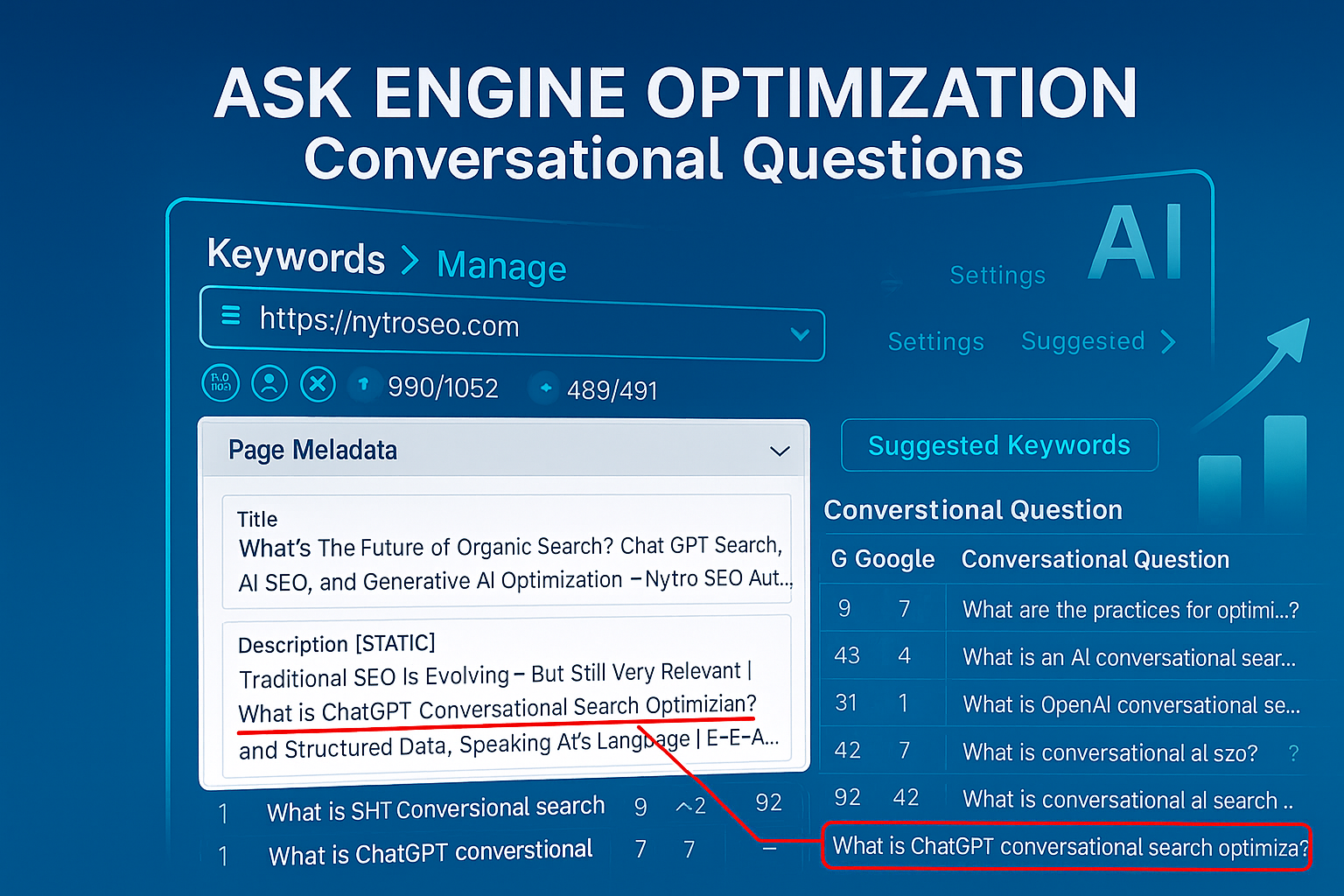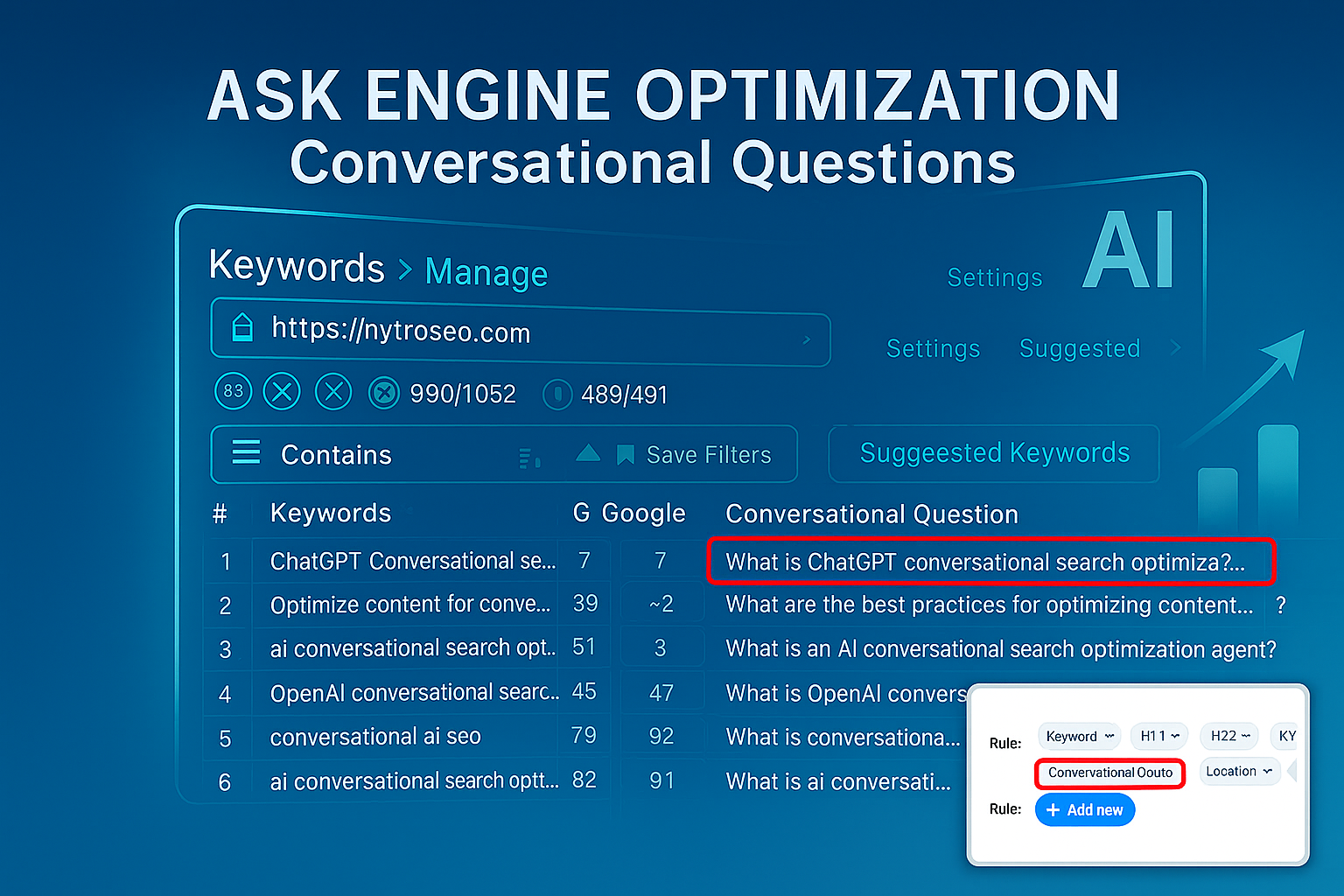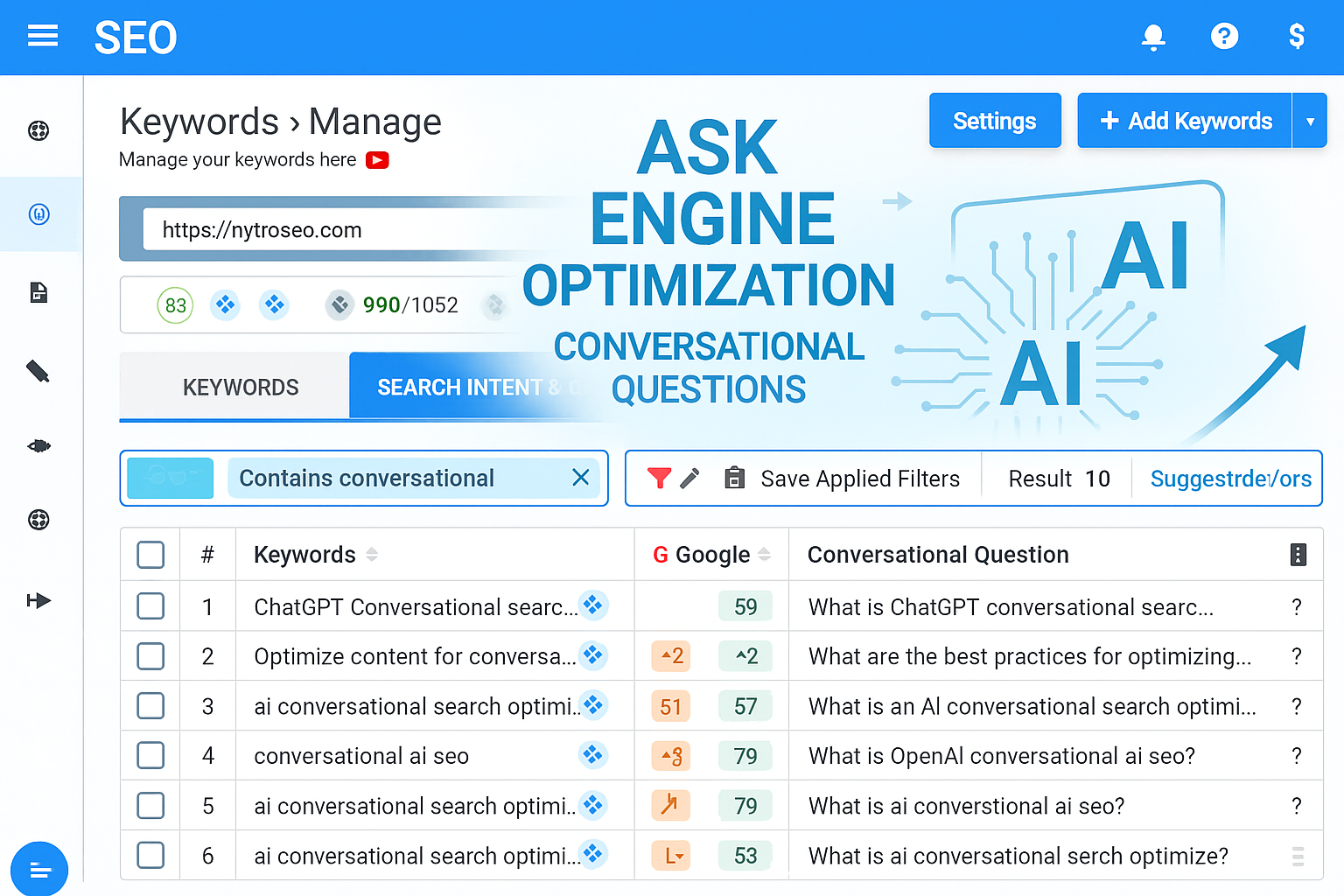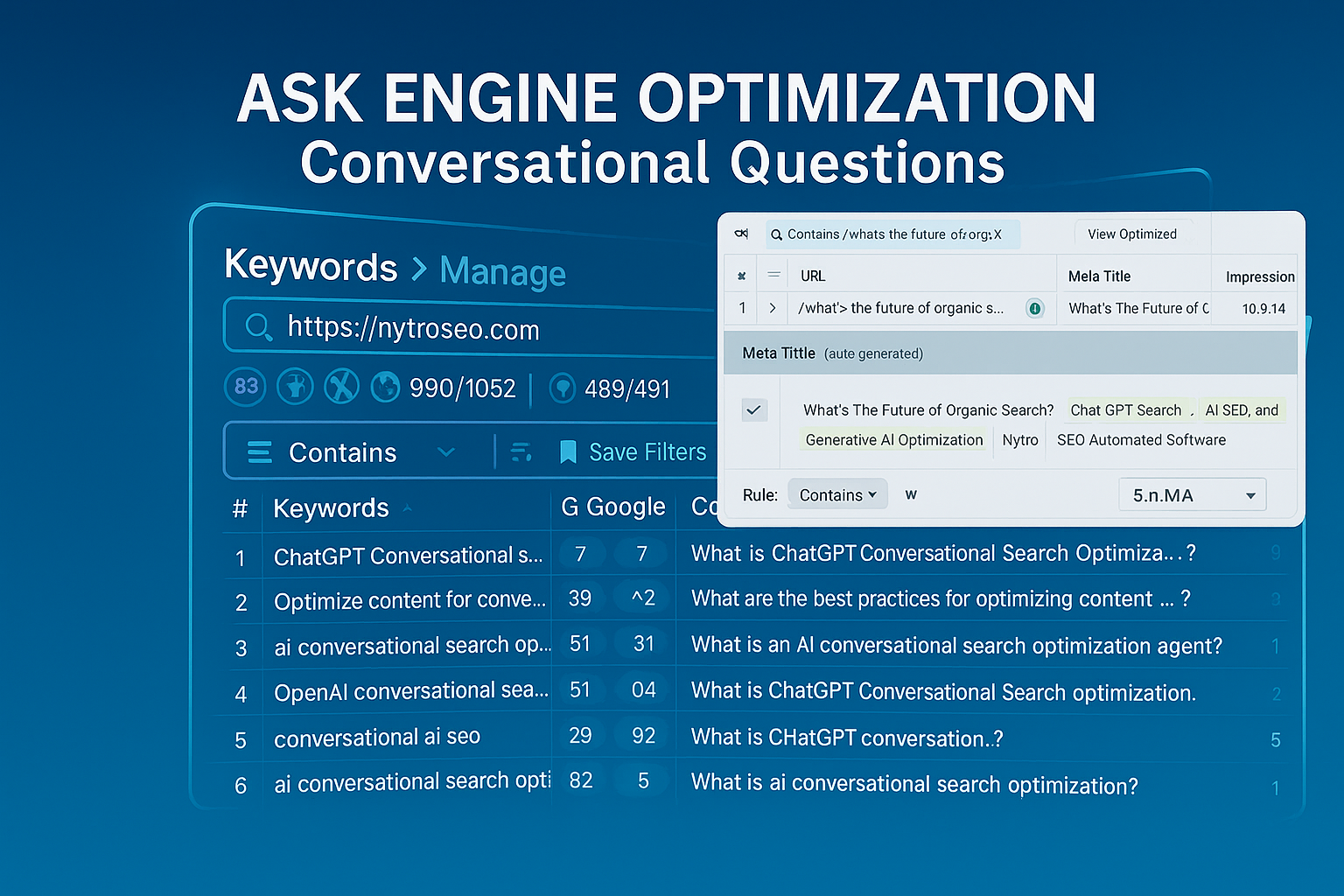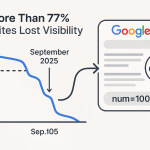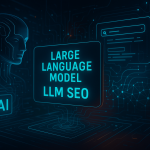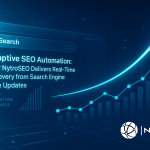Ask Engine Optimization (AEO) is a strategy that goes beyond traditional SEO by focusing on optimizing content to be the direct, authoritative answer in AI-powered search results, voice assistants, and chatbots. It involves using structured data, optimizing for user intent with clear, concise, and conversational answers, and creating content like FAQs to be recognized by AI systems as the definitive source for a user’s query.
Evolution of Search Strategies 2025 to 2030: Why Ask Engine Optimization Matters in the Era of Conversational AI
The nature of search is changing at a pace never seen before. Long gone are the days when ranking high in Google was solely about keyword density, backlinks, and meta descriptions. Today’s digital landscape is evolving beyond traditional SEO toward a new frontier – Ask Engine Optimization (AEO). With the advent of AI-powered search bots like ChatGPT, Google’s AI Overviews, and conversational platforms such as Perplexity, optimizing your website demands new strategies that go far beyond the basics.
Ask Engine Optimization (AEO), also known as Answer Engine Optimization, is a digital marketing and seo strategy focused on making content directly answer user queries to appear prominently in AI-driven search results, voice assistants, and chatbots, rather than just ranking on a traditional search engine results page (SERP)
Ask Engine Optimization revolves around making your content not only discoverable but also understandable, directly answerable, and authoritative in these emerging AI-driven environments. This guide explores how to implement AEO Ask Engine Content Optimization across your website – positioning your business as the primary source for both human users and advanced AI bots.
Ask search optimization isn’t just another SEO trend. It’s the bridge connecting user intent, structured content, and conversational answers, ensuring your site stands out in both traditional and emerging search interfaces. Whether your visitors type queries into Google or ask for answers through ChatGPT or a voice assistant, your content must be built to serve as the definitive response.
Optimizing for AI ask search strategies means anticipating conversational queries, structuring information with precision, and using tactics like schema markup, FAQ pages, and targeted conversational answers. It also involves staying current with evolving models, such as AI ask search optimization for new semantic engines and persistent innovations from Google and OpenAI. As traditional search and AI-driven ask interfaces converge, the ability to deliver clear, authoritative, and contextually rich content is not a future competitive advantage – it’s essential now.
In the sections that follow, we’ll dive into actionable steps for Ask Engine content Optimization AEO, AI Ask Engine Optimization, and the methodologies that put your website in the answer seat – regardless of how people (or machines) are searching.
Ask Engine Optimization AEO: Key Components for Modern Ask Search Optimization & AI Ask Search Strategies
To achieve success with Ask Engine Optimization (AEO), you must master the interplay of search intent, answer targeting, technical schema, and conversational content that current and emerging AI search bots demand. Below, we map out actionable steps for AEO Ask Engine Content Optimization and integrate many crucial secondary keywords to guide your journey.
How to Implement AEO
Ask Search Optimization: Understanding User Intent in an AI World
The starting point of effective Ask Engine Optimization is user intent. Unlike classic SEO, ask search optimization demands that you not only know what your audience is searching, but how and why they’re asking. AI chatbots like ChatGPT and Google Overviews decode questions for meaning, nuance, and conversational cues – all of which you must anticipate.
Categories of Ask Search Intent:
- Informational: e.g., “What is AI Ask Engine Optimization?”
- Navigational: e.g., “AI ask search content optimization tools”
- Transactional: e.g., “Sign up for AI ask content search strategies”
- Comparative: e.g., “AEO Ask Engine Optimization vs. traditional SEO”
Effective AEO Ask Engine Content Optimization begins with mapping every page to these intent buckets. Your site becomes the answer hub for people and machines by serving intent-driven, expertly structured content.
AI Ask Search Content Optimization: Harnessing Schema and Structured Data
Structured data is the engine of AI ask search content optimization. Schema markup – particularly for FAQs, HowTo, and Product Reviews – provides search engines and AI bots with Q&A roadmaps, increasing the impact of your Ask Engine Optimization.
- FAQ Schema: Surfaces Q&A content in Google People also ask and similar modules.
- HowTo Schema: Powers solution-driven answers in AI/conversational search results.
- Product Schema: Equips transactional pages for more direct selection by AI bots.
Automated solutions like NytroSEO inject updated schema instantly as content changes, powering real-time AEO Ask Engine Content Optimization.
ChatGPT Ask Optimization: Direct, Conversational Answers
A core factor for ChatGPT ask optimization, as well as AI ask search strategies, is crafting content that is clear, direct, expert, and conversational. To optimize content for conversational AI platforms and AI-powered conversational search optimization, implement:
- Q&A in natural language – mirroring how users ask questions.
- Concise, direct answers – enabling easy extraction by chatbots.
- Answers able to stand alone – AI agents may pull responses out of context.
Success with AI SEO Conversational search, OpenAI Conversational search optimization, and similar strategies depends on these practices.
The cornerstone of effective Ask Engine Optimization isn’t just technical implementation – it’s the interplay between metadata, conversational question targeting, and automated on-page optimization. NytroSEO has redefined this process with advanced functionality built to meet both current and future AI-powered search needs.
How Conversational Question Meta Tags Maximize Visibility
One of the most powerful features available through NytroSEO is the automated generation and injection of conversational questions directly into your page’s meta tags. This process boosts your chances of being picked as a direct answer source by AI systems, transforming your content into the rich, structured answers favored by voice assistants and chatbots.
NytroSEO Automatically Apply Conversational Questions to any number of related and relevant pages
The Mechanics Behind NytroSEO’s Solution
- Automatic Extraction of Relevant Questions: NytroSEO analyzes existing page content, extracting questions that users are most likely to ask in both traditional and conversational search settings.
- Intelligent Meta Tag Construction: It automatically generates conversational question meta tags and aligns them precisely with page topics and user intent, following best practices outlined in NytroSEO’s conversational question optimization guide.
- Real-Time Updates: Any content change on your website is immediately mirrored in your meta tags, ensuring continuous relevance for new search queries or AI model updates.
Why Conversational Questions Matter for AI Ask Search Content Optimization
AI search interfaces, from “People also ask” in Google to large language models powering ChatGPT, prioritize content that is structured as or mapped to commonly asked questions with clear, direct answers. Using tools that automate this markup – like NytroSEO – establishes your site’s authority in AI-powered query resolution.
- Boost in Rich Snippet Inclusions: Pages optimized with conversational meta questions are more likely to appear in People also ask google cards and AI-powered answer modules.
- Increased Click-Through Rate: Direct, question-based titles and descriptions attract both users and AI engines seeking to resolve specific queries quickly.
- Higher Selection by AI Search Bots: Structured Q&A content gives platforms like Perplexity and OpenAI the context they need to select your answer for voice search, chat interfaces, or AI Overviews.
Best Practices for AEO Ask Engine Optimization Meta Tags
Whether automating with NytroSEO or implementing manually, always:
- Target question-based keywords in title and description meta tags
- Mirror “people also ask” and ChatGPT ask-search strategies using natural, conversational phrasing
- Situate primary and secondary questions at the start of the meta description when possible
Consistency across pages amplifies your AEO Ask Engine Content Optimization efforts, helping search bots form reliable site-level topic associations – essential for ongoing authority in new AI-driven answer engines.
NytroSEO in Action: Making Your Content AI-Ready
NytroSEO’s dynamic meta tags and structured data engine seamlessly aligns your content for maximum impact on both legacy and future-facing search platforms. By automating both the extraction of conversational questions and the technical meta tag updates, it eliminates the need for manual, page-by-page optimization – allowing your team to focus on creating fresh, high-quality content while your technical SEO stays future-proofed.
NytroSEO AEO Automatic Optimization
In the rapidly transforming world of Ask Engine Optimization (AEO), speed, precision, and automation are the keys to capturing answer boxes and voice results before your competitors do. NytroSEO bridges this gap with its unique AI-powered solution that brings true hands-off Ask Engine Content Optimization for both traditional and next-generation AI search experiences.
How NytroSEO Automates AEO from Keyword to Click
NytroSEO leverages a blend of advanced artificial intelligence and deep natural language processing to understand not only the topical focus of your website, but also the actual user intent behind each search query related to your core keywords. Here’s how Nytro delivers automatic optimization for every webpage:
- AI-Driven Search Intent Analysis: Nytro’s system continuously scans your page content, identifying the most important keywords and inferring the underlying user search intent. This real-time content analysis means your pages are always mapped to emerging search themes and question trends.
- Conversational Question Generation: Using the latest AI models for conversational search optimization, Nytro automatically crafts highly relevant questions – phrased exactly as your target audience would ask them in Google, ChatGPT, Perplexity, or AI chatbots. These questions aren’t generic; they’re tailored implicitly to the actual content and searcher needs of each webpage.
- Meta Tag & Snippet Optimization: NytroSEO injects these AI-generated, intent-aligned questions directly into your page’s meta tags (including custom meta-title and meta-description fields). This ensures not only greater visibility in People Also Ask features and answer modules, but also that your search snippets stand out as the definitive response – driving higher click-through rates (CTR) and engagement from both human users and AI-powered agents.
- Automatic Updates and Consistency: As soon as your webpage content or keywords change, Nytro instantly refreshes the set of conversational questions and meta tags. This keeps your search presence perfectly aligned with evolving search algorithms, click behaviors, and conversion trends.
Why Nytro’s Approach Drives More Engagement and Voice/AI Selections
- Higher Ranking for Answer-Focused Queries: By auto-generating and embedding question-based meta tags, NytroSEO substantially increases your likelihood of being featured in AI answer modules, FAQ snippets, and Google’s People Also Ask sections.
- Maximized Click-Through & Conversion: Nytro’s optimized snippets are purpose-built for high visibility and persuasion – boosting both CTR and subsequent conversions from search users.
- Future-Proof for Conversational Search: As AI search agents and chatbots become primary interfaces, Nytro ensures your content stays competitive – without ongoing manual labor or technical SEO overhead.
[You can add your NytroSEO dashboard or meta optimization screenshot here.]
For deeper strategies and example applications, see Is Your Brand Ready for AI Search? NytroSEO’s Guide and Optimizing Content for Questions.
Building Content for Ask Search: Schema, FAQs, and Direct Answers for AI and People
Success with Ask Engine Content Optimization AEO depends heavily on aligning site structure, schema, and content formats with both human users and machine interpreters.
FAQ and Conversational Schema: Foundation for AI Ask Search Content Optimization
- FAQ Sections: Integrating clear FAQ blocks on relevant pages makes your expertise crawlable not just by search engine robots, but also AI conversation agents.
- Schema Markup Implementation: Applying FAQ schema turns your on-page Q&As into machine-readable data, supporting rapid answer extraction for modules like Google’s People also ask or conversational assistants.
- Question Clustering: Identify and group related questions, mapping each to a single, comprehensive answer. This creates topic density and boosts both ask search content optimization and natural SEO – improving your odds of owning “People also ask” answers and AI Overview spots.
Optimizing for Conversational AI: Formatting Matters
- Keep answer sentences tight, factual, and context-rich – AI engines favor answers that can stand alone.
- Use bullet lists or ordered steps sparingly for process-related queries, as structured responses map cleanly to voice and chatbot interfaces.
- Every FAQ or answer block should echo the phrasing and structure used in known high-traffic queries, using tools to identify exact “people also ask” items for your topics.
Real-World Example: Parse and Adapt Search Signals
Analyzing search result features – like which questions appear repeatedly in Google People also ask or which types of questions ChatGPT delivers for your target phrases – should inform your AEO Ask Engine Content Optimization. Routinely update and expand both your page-level FAQs and meta tag questions to mirror these trend signals.
Leveraging NytroSEO’s Conversational Meta Tags Automation
NytroSEO doesn’t just automate meta question creation; it also injects conversational schema and internal Q&A links, reinforcing your status as a hub for both Google and AI-powered bots. The result: stronger ask search strategies, more robust answer authority, and increased visibility in every AI ask search optimization environment.
A methodical focus on question targeting, schema depth, and content updating turns static webpages into active sources for new and emerging search engines.
Advanced Tactics for AEO: Internal Links, Content Clustering, and Authority Building
Once your answers are structured and meta tags optimized, elevating your overall authority and visibility in ask-driven search requires more sophisticated tactics.
1. Content Clustering and Topical Depth
Instead of isolated blog posts or stand-alone landing pages, group your content around central topics, each with their own cluster of interlinked subpages or supporting FAQs. This thematic clustering signals expertise and satisfies a range of related Ask Engine Optimization AEO queries – helping AI bots and search engines associate your website with comprehensive topical authority.
- For example, if you’re targeting “AI Ask Engine Content Optimization,” spin off supporting FAQ articles, how-to guides, and best practice resources, all internally linked.
2. Automated Internal Linking for Conversational Content
Internal links serve as guideposts for both users and bots, connecting question-rich hubs to deep-dive, detailed answer pages. By automating these relationships – using a solution like NytroSEO’s internal linking engine – you amplify both crawlability and semantic association.
- Best Practice: Link FAQ answers directly to long-form explainers or tools, driving fresh session paths and reinforcing answer authority for both ChatGPT ask optimization and Google’s conversational analysis.
3. Adaptive Content: Staying Ahead of Algorithm Shifts
Ask Engine Optimization is highly dynamic. Suddenly, a new model update from OpenAI or a change in Google’s AI Overviews can shift the types of questions being prioritized. Rely on platforms that actively monitor search and conversational algorithm changes, adapting your question focus, answer depth, and schema in near real time.
According to Search Engine Journal’s latest updates on AI search trends in 2024, brands that automate question discovery and continuously optimize for conversational context secure a long-term edge in both organic and AI-driven environments.
4. Building External and Brand Authority for People Also Ask SEO
- Secure citations from reputable, authoritative sources within your domain.
- Ensure guest content, social signals, and brand mentions reference the same core questions and answers for strong AI Ask Engine Optimization – Google’s algorithms (and AI bots) factor consensus and trust signals into answer selection.
- Feature case studies, testimonials, or expert interviews to bolster both E-E-A-T (Experience, Expertise, Authority, Trust) and “People also ask” optimization efforts.
5. Consistency Across All Platforms
Maintain tightly aligned messaging, meta questions, and schema markup across web, mobile, and chatbot platforms. This unified approach strengthens your presence as a top-tier answer source, smoothing the path for cross-platform Ask search optimization.
Real-World Results: AI Ask Search Optimization and the Impact of Automation
How do these tactics play out when put into practice – with concrete results, not just theory? The answer lies in the performance data seen by sites implementing AI-powered ask search optimization strategies at scale.
Case Outcomes from Automated Ask Engine Content Optimization
Brands using platforms such as NytroSEO consistently report:
- Dramatic increases in FAQ-featured snippets and People also ask box placements: Automated conversational question meta tags (per NytroSEO’s strategic guide) result in higher featured visibility, especially for highly competitive queries in finance, e-commerce, and technical domains.
- Growth in AI-driven search discovery and chatbot answer selections: AI ask search strategies, properly executed, have been shown to boost answer shares in platforms like Google Overviews or ChatGPT plugins, driving traffic that would otherwise bypass traditional SEO channels.
- Sustained improvement in topical authority signals and session engagement: Automated site-wide Q&A schema injection fosters deep topical authority, increasing both average session duration and brand recall among users coming from both traditional and AI interfaces.
Automated Platforms: The Edge for Agencies and Enterprises
For agencies, publishers, and enterprise-scale websites facing the sheer volume and velocity of trend changes in ask-based search, automation is essential. Manual optimization of questions, meta tags, schema, and internal linking rapidly becomes unmanageable at scale. Automated ask engine optimization tools don’t replace expertise – they multiply its reach and endurance in an AI-first world.
For example, with NytroSEO’s real-time code injection, agencies optimize tens of thousands of pages per month without manual touch, instantly responding to algorithm or query trend shifts. This operational agility is what separates high-growth brands from those left behind as search paradigms move toward direct AI answers.
The Competitive Advantage of Continuous Optimization
In 2024 and beyond, sites that combine in-depth knowledge of ask search strategies with advanced automation will consistently rank among the top answer sources – securing durable organic traffic streams, higher conversion rates, and a lasting reputation as the go-to authority for both human users and AI bots.
For a comprehensive look at these changing dynamics, review NytroSEO’s future of search analysis, which explores how AI SEO conversational search will reshape user behavior and content strategy.
AEO vs SEO: How AEO Differs from Traditional SEO
Ask Engine Optimization Examples: Real-World Applications
To make the transition from theory to practice, here are some clear examples showcasing how Ask Engine Optimization (AEO) improves visibility, engagement, and answer rates in today’s AI-driven search ecosystem:
Local Business Example
Search Query: “Where can I find the best pizza near me?”
- AEO Strategy: Develop a dedicated landing page or blog post directly answering this question, such as “Best Pizza Near Me: Top-Rated Local Pizzerias in [City Name].” Use structured data including local business schema and feature location-based keywords, opening hours, and user reviews.
- Benefit: Your content is more likely to be featured as a direct answer by Google’s People also ask box, appear in local voice searches, and surface on conversational platforms assisting users looking for pizza options in real time.
Nutrition Website Example
Search Query: “How many calories are in an apple?”
- AEO Strategy: Publish an article titled explicitly with the question. Start the page with a concise, prominent answer (e.g., “There are approximately 95 calories in a medium apple.”) followed by expanded nutrition facts, visual tables, and a structured FAQ for related questions.
- Benefit: Makes it straightforward for AI-powered platforms and search engines to extract and feature your page in answer snippets or direct question-and-answer modules for both search and chat-based queries.
FAQ Page Example
Search Query: “What are the best ways to reduce plastic waste?”
- AEO Strategy: Create a robust FAQ page with this query as a heading, followed by a succinct, authoritative answer and several bullet-point methods. Supplement the page with relevant FAQ schema so search engines can easily process the Q&A structure.
- Benefit: This content structure increases the odds of your answer being selected by AI bots, featured in Google’s People also ask results, and cited in AI Overviews or voice assistant responses.
AI Assistant Example
Search Query: “What is the capital of Peru?”
- AEO Strategy: Optimize your informational page on Peru so that it clearly states, early and unambiguously, that Lima is the capital. Include structured data (e.g., About schema or Fact schema) that marks this information as a direct answer.
- Benefit: AI assistants, voice search engines, and chatbots will reliably pull and present this answer to users, with your site credited as the source.
By analyzing how these scenarios play out, site owners, agencies, and content creators can model their pages for both typical queries and voice/conversational search – delivering optimized responses that dominate AI and traditional answer boxes alike.
- SEO (Search Engine Optimization) focuses on improving a website’s ranking in traditional search engine results, while AEO (Answer Engine Optimization) optimizes content to provide direct, concise answers within AI-powered platforms like Chat GPT AI chatbots, Google overviews, and then linking to the source of the answer.
Search Engine Optimization (SEO)
- Goal: To drive users to a website by achieving high rankings in traditional search engine results pages (SERPs).
- Focus: Ranking content for specific keywords and user intent so that users click through to visit a website.
- Tactics: Keyword research, on-page optimization, technical SEO (mobile-friendliness, site speed), content creation, and building backlinks.
Answer Engine Optimization (AEO)
- Goal: To position content as the direct, authoritative answer for specific user queries within emerging AI tools.
- Focus: Providing clear, concise, and direct answers to satisfy users with instant, voice-friendly responses, often without requiring them to visit a web page.
- Tactics: Using structured data (schema markup), answering specific questions clearly, optimizing for conversational queries, and structuring content so AI systems can easily extract it.
The integration of both approaches is increasingly essential for modern digital strategies, as blended search and answer engine results shape the pathways users take to access information.
Ask Engine Optimization FAQ: Your Questions Answered
Ask Engine Optimization (AEO) is the practice of optimizing your content so that it serves as the direct, definitive answer for AI-powered search tools, conversational chatbots, and new “ask” interfaces like ChatGPT and Google Overviews. Unlike traditional SEO, which focuses on rankings in search engine results pages, AEO is about structuring your answers, markup, and meta tags so that your site is prioritized as the authoritative response for natural language queries, voice assistants, and conversational platforms.
- Direct Answers: AEO aims to provide quick, direct answers to user questions rather than a list of links.
- AI & Voice Search Focus: It optimizes content for answer engines, AI chatbots, and voice assistants like Siri and Alexa, which process questions in natural, conversational language.
- Shift from Traditional SEO: While traditional SEO focuses on ranking keywords, AEO focuses on answering specific user questions and aligning with user intent.
- Evolving Search Behavior: Users are increasingly asking questions in full sentences, especially with voice search and AI chatbots for answers.
- Increased Visibility: By optimizing for AEO, businesses can appear in prominent features like AI Overviews and Featured Snippets, which are often the first results users see.
- Brand Authority: Providing accurate, concise answers builds trust and establishes a brand as a credible authority in its niche.
- Query Research: Identify common questions your target audience asks in your niche.
- Content Structuring: Organize content using question-and-answer formats, clear headings, and concise answers.
- Structured Data: Implement structured data and schema markup to help search engines understand your content’s context. (This is a key optimization step and a planned feature for upcoming NytroSEO releases).
- Conversational Language: Use natural, conversational language and long-tail keywords to match how people speak when searching.
- Focus on Key Content Types: Create content like FAQs, how-to guides, and “people also ask” sections to target answer boxes.
AEO complements and enhances traditional SEO rather than replacing it outright. As search evolves, integrating both strategies provides the best chance of maximizing visibility across all channels.
AEO and SEO each play unique roles. While AEO excels at surfacing direct answers in AI tools and featured snippets, SEO remains essential for broader organic rankings and driving website traffic. They work best when used together.
AEO stands for Answer Engine Optimization and refers to optimizing content specifically for AI-driven answer systems, voice assistants, and conversational search, building upon and expanding traditional SEO practices.
Optimizing for “People also ask” and conversational queries helps your content surface in AI-powered answer modules and chatbot interfaces. AI search engines and voice assistants scan for clearly structured Q&A content, often presented in FAQ format with proper schema. When you align your meta tags and on-page answers with these questions – especially using automated tools like NytroSEO – you greatly improve your chances of becoming the source selected by both Google’s algorithms and AI models like ChatGPT for user queries.
In 2025, automation platforms that handle conversational question meta tags, schema injection (a planned NytroSEO feature), and adaptive internal linking – such as NytroSEO – offer the highest ROI for Ask Engine Content Optimization. Combine this automation with regular review of trending “people also ask” questions, frequent FAQ updates, and clustering of content around major topics to ensure your site remains a top authority for both traditional and AI-driven search bots.
- By embracing AEO Ask Engine Content Optimization and continuously refining your approach – through both strategic content development and advanced automation – your business will be positioned as the answer both people and AI-powered interfaces seek. This isn’t merely the future of SEO; it’s the present imperative for any brand that wants to lead in the next era of search.
- By embracing AEO Ask Engine Content Optimization and continuously refining your approach – through both strategic content development and advanced automation – your business will be positioned as the answer both people and AI-powered interfaces seek. This isn’t merely the future of SEO; it’s the present imperative for any brand that wants to lead in the next era of search.

